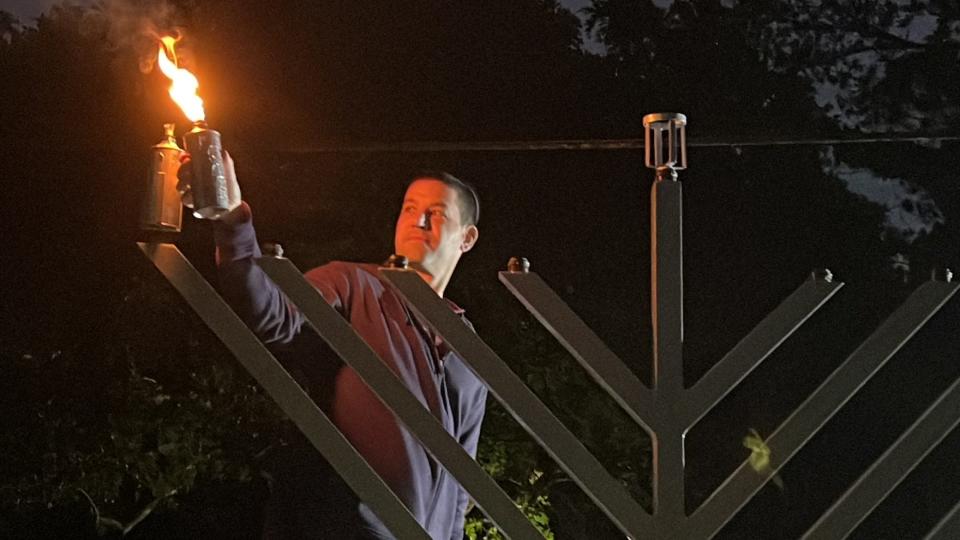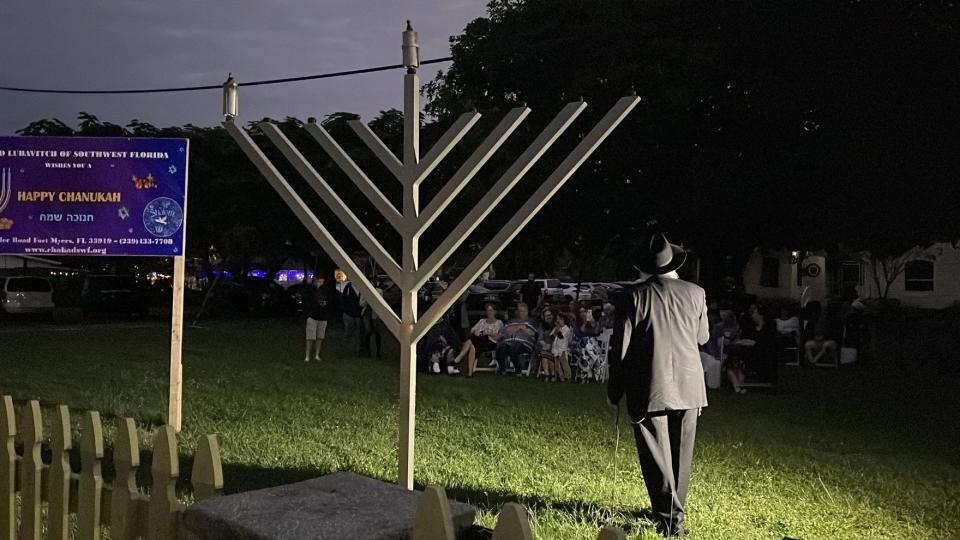Lighting of menorah in Fort Myers reflects 2,000-year-old Hanukkah miracle
Flames of light atop a large menorah along McGregor Boulevard on Sunday evening heralded the start of the Jewish holiday of Hanukkah, symbolizing lighting the darkness.
That symbolism observed at sundown at Chabad Lubavitch in Fort Myers matched similar celebrations across Collier and Lee counties and around the world Sunday night.
"That's why we light the menorah in a public place," said Rabbi Yitzchok Minkowicz from Chabad Lubavitch. "We're going to light up the night physically and spiritually. The light of Hanukkah is very powerful."
The eight-day observance recalls a miracle in a Jerusalem temple during a war fought 2,000 years ago against the Greeks by the Maccabees, a group of Jewish rebel warriors, for religious freedom.
Southwest Florida celebrations:
Hanukkah celebrations come to the community in Collier, Lee and Charlotte counties
Christmas, Hanukkah events in Fort Myers, Cape Coral, Bonita Springs, Port Charlotte
Top things to do in Fort Myers, Cape Coral for Christmas, Hanukkah 2021

During the conflict, a lamp being used to light the temple had only enough oil to burn for a single day yet burned for eight days. In honor of that miracle, Jews light candles on a menorah for eight days.
Hanukkah starts on the 25th day of Kislev, which is the ninth month of the Hebrew calendar, with the singing of holiday songs, eating oily foods and playing dreidel, a spinning top.
At Chabad Lubavitch, dozens gathered at sunset Sunday to watch two small containers of kerosene set afire on top of a large menorah. The aluminum menorah was constructed on land the Chabad recently purchased fronting McGregor Boulevard and abutting its current property along Winkler Road.

Brian Fox, who attends the Chabad and was involved in setting up the Hanukkah celebration with his family, was given the honor of lighting the menorah.
"We're just so blessed to be able to participate," Fox said. "It's meaningful for the family and the community to share in the joy and happiness."
Minkowicz said the kerosene flames, symbolic of the original oil from the lights 2,000 years ago, would stay lit for about an hour Sunday and eventually be replaced by lightbulbs for safety. The remaining Hanukkah lights are bulbs lit daily through Dec. 5.

The Chabad's menorah lighting schedule is: 2nd-5th candles, Monday-Thursday, 5:45 p.m.; 6th candle, Friday, 4:15 p.m.; 7th candle, Saturday, 6:30 p.m., 8th candle, Sunday, 6:30 p.m. The changes in time reflect the lighting of candles Friday for Shabbat, the Jewish day of rest, on Saturday night after Shabbat is over, and then for a special event on the final night.
Chabad Lubavitch's Hanukkah celebration concludes at 3 p.m. Dec. 5 with an event at Castle Golf on Gladiolus Drive with free golf, holiday food of hot latkes and doughnuts, drinks and music and the lighting of the Grand Chanukah Menorah.
Guest opinion: Right-Wing identity politics threaten Holocaust education
Religious and other celebrations in late 2021
Christmas: Christians in the West celebrate Christmas on Dec. 25, as the day when Yeshua of Nazareth (a.k.a. Jesus Christ) was born. He is regarded by most Christians as deity and savior of humanity. The Eastern Orthodox churches celebrate Christmas on Dec. 25 according to the Julian calendar, which is Jan. 7 in the more commonly used Gregorian calendar.
Kwanzaa: A weeklong celebration which starts on Dec. 26. It is a recently developed cultural holiday celebrating African-American heritage that has been an annual tradition since 1966. "Kwanza" is derived from the Swahili phrase "matunda ya kwanza," which means "the first fruits of the harvest." Each day focuses on one of the seven principles of Kwanza: unity, self-determination, collective work, responsibility, cooperative economics, purpose, creativity and faith.
Buddhists : Bodhi Day (a.k.a. Rohatsu) on Dec. 8, or on the Sunday immediately preceding. It recalls the day in 596 BCE, when the Buddha sat beneath a Bodhi tree — a type of fig tree — and is believed to have achieved enlightenment, thus escaping the repeating cycle of reincarnation: involving birth, life, death and rebirth. A descendent of the original tree is the most important of four holy sites of Buddhism.
Muslim: Muslims' holy days are fixed to the lunar calendar. On successive years, the days migrate about 10 days earlier as viewed on the Gregorian calendar. Id al-Adha (a.k.a. the Feast of Sacrifice or Day of Sacrifice) occurs during the 12th lunar month of the Islamic year. This immediately follows the Hajj (pilgrimage to Mecca). It recalls the day when Abraham intended to follow the instructions of God and sacrifice his son Ishmael.
Some Native Americans and Aboriginal groups elsewhere in the world observe the Winter Solstice. They associate different beliefs and rituals with it.
Wiccans and some other Neopagans celebrate Yule at the time of the Winter Solstice.
Festivus: A celebration for the rest of us: This is a new celebration, created in 1966 and popularized on a Seinfeld comedy episode in 1997.
More on other December celebrations can be found at www.religioustolerance.org/xmas_other.htm
Connect with breaking news reporter Michael Braun: MichaelBraunNP (Facebook), @MichaelBraunNP (Twitter) or mbraun@news-press.com.
This article originally appeared on Fort Myers News-Press: Hanukkah begins in Fort Myers with menorah lighting at Chabad Lubavitch

